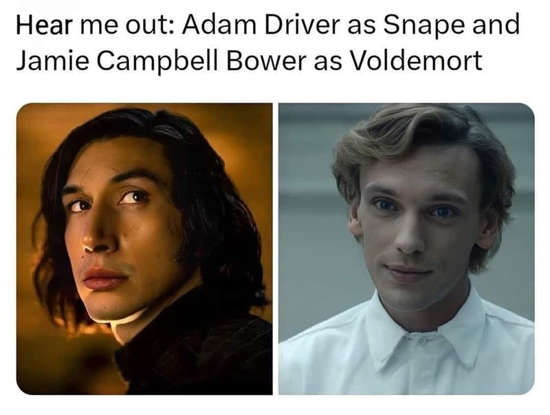- Joined
- Jul 18, 1998
- Messages
- 25,427
- Reaction score
- 55,208
Online
Someone should tell Warner Bros: there’s no such thing as magic. No matter how uncanny the rabbit from the hat, how mesmeric the levitation, it’s always just an illusion. The notion of readapting Harry Potter for a new TV series – which the studio has just confirmed under its new streaming service, Max – has the neon allure of a great magic trick.
One wave of the wand, and you’ve got a seven-season TV sensation at your fingertips. An army of devotees conjured in a flash. That’s the idea, of course. But for us muggles in the real world, things are never so simple.
The truth is, there have been signs for years that Harry Potter’s spell over the general public may be slowly wearing off. This is somewhat inevitable, of course, when you have a brand as globally popular as JK Rowling’s wizarding series once was.
The books on their own have made billions of pounds; the eight film adaptations, starring Daniel Radcliffe as the tousle-haired boy wizard, made just as much. Potter’s early 2000s ubiquity was never going to be sustainable.
But in recent years, other unexpected doubts have set in. Some of these, of course, have to do with Rowling, whose public image has been consumed by a transphobia row that has rendered her a deeply unpopular figure with many queer and otherwise progressive audiences. Any new adaptation will inevitably face criticism in this regard, but if the recent sales figures of the Hogwarts Legacy video game are anything to go by, we’re not at the point where Rowling’s association can be considered a meaningful financial deterrent.
There are, however, countless other reasons to question the logic behind a Harry Potter TV series. Less than a year has passed since Warner Bros had to – rather humiliatingly – abandon its spin-off franchise, Fantastic Beasts, halfway through the planned run of five films.
There have been a number of factors ascribed to Beasts’ failure. The controversial presences of Johnny Depp and Ezra Miller. The jarring period setting. For many people, though, the problem was that it just wasn’t Harry Potter.
While the 2001-2011 films drew mixed critical receptions, they had been embraced wholeheartedly by the Potter fanbase. It scarcely mattered that Radcliffe, Rupert Grint, and Emma Watson were stilted, dramatically uncompelling child actors. To the fans, they were Harry, Ron and Hermione.
Likewise, the countless older thesps who filled out the world of Hogwarts: Robbie Coltrane; Maggie Smith; Alan Rickman. How do you possibly re-cast Severus Snape? However good the new cast is, it’s always going to feel like you’ve been served Pepsi and told it’s Coke…….

 www.independent.co.uk
www.independent.co.uk
One wave of the wand, and you’ve got a seven-season TV sensation at your fingertips. An army of devotees conjured in a flash. That’s the idea, of course. But for us muggles in the real world, things are never so simple.
The truth is, there have been signs for years that Harry Potter’s spell over the general public may be slowly wearing off. This is somewhat inevitable, of course, when you have a brand as globally popular as JK Rowling’s wizarding series once was.
The books on their own have made billions of pounds; the eight film adaptations, starring Daniel Radcliffe as the tousle-haired boy wizard, made just as much. Potter’s early 2000s ubiquity was never going to be sustainable.
But in recent years, other unexpected doubts have set in. Some of these, of course, have to do with Rowling, whose public image has been consumed by a transphobia row that has rendered her a deeply unpopular figure with many queer and otherwise progressive audiences. Any new adaptation will inevitably face criticism in this regard, but if the recent sales figures of the Hogwarts Legacy video game are anything to go by, we’re not at the point where Rowling’s association can be considered a meaningful financial deterrent.
There are, however, countless other reasons to question the logic behind a Harry Potter TV series. Less than a year has passed since Warner Bros had to – rather humiliatingly – abandon its spin-off franchise, Fantastic Beasts, halfway through the planned run of five films.
There have been a number of factors ascribed to Beasts’ failure. The controversial presences of Johnny Depp and Ezra Miller. The jarring period setting. For many people, though, the problem was that it just wasn’t Harry Potter.
While the 2001-2011 films drew mixed critical receptions, they had been embraced wholeheartedly by the Potter fanbase. It scarcely mattered that Radcliffe, Rupert Grint, and Emma Watson were stilted, dramatically uncompelling child actors. To the fans, they were Harry, Ron and Hermione.
Likewise, the countless older thesps who filled out the world of Hogwarts: Robbie Coltrane; Maggie Smith; Alan Rickman. How do you possibly re-cast Severus Snape? However good the new cast is, it’s always going to feel like you’ve been served Pepsi and told it’s Coke…….

A Harry Potter TV adaptation is a cursed idea
Bringing JK Rowling’s wizarding franchise back to the screen might seem like a no brainer for Warner Bros, writes Louis Chilton. Look closer, though, and it’s clear a reboot is a dicey proposition


